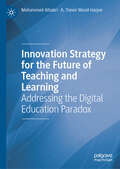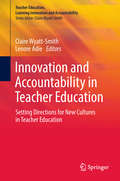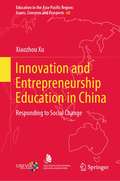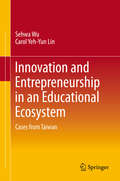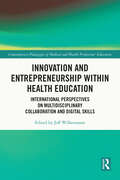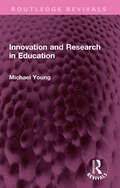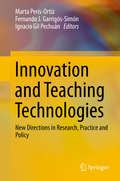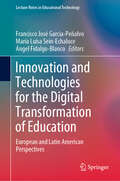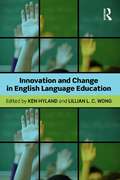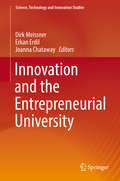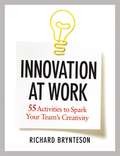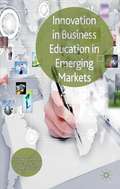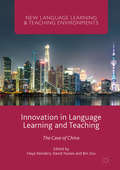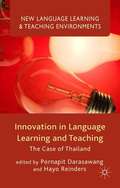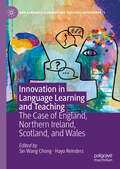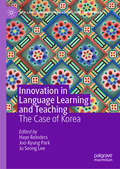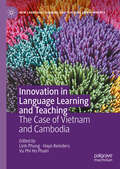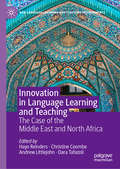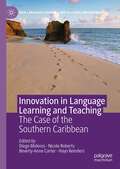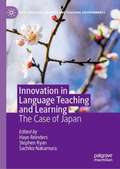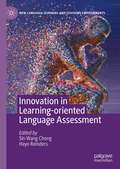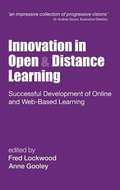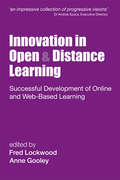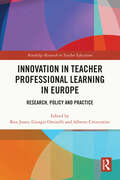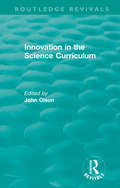- Table View
- List View
Innovation Strategy for the Future of Teaching and Learning: Addressing the Digital Education Paradox
by A. Trevor Wood-Harper Mohammed AlbakriThis book delves into the contemporary education paradox between traditional and digital education, with particular emphasis on the contemporary digital education tools and technologies that can facilitate education practices beyond pedagogy. The central argument of this book is that traditional education methods are no longer sufficient to meet the needs of education institutions and stakeholders, which is why digital education is the future to satisfy these needs. It considers the holistic nature of education practice beyond pedagogy and digital education technology to include other practices such as knowledge management, policy, and ethics, among other practices led by contemporary ICTs. It will be a vitally important resource for scholars and students of education practice, emerging technologies and innovation management, as well as business and organisational ethics.
Innovation and Accountability in Teacher Education: Setting Directions for New Cultures in Teacher Education (Teacher Education, Learning Innovation and Accountability)
by Claire Wyatt-Smith Lenore AdieThis is the foundational book for the new series, Teacher Education, Learning Innovation and Accountability. The book canvasses research, practice and policy perspectives in teacher education across diverse geographic, social and political contexts. It explores the lifespan of teacher development from initial preparation through to graduate classroom practice as it occurs in an intensifying culture of standards and regulation. The characterization of initial teacher education (ITE) in a crucible of change permeates throughout the book. The chapters open up new ways of thinking about innovation and accountability in ITE and the professionalization of teaching, exploring fundamental questions, such as “Who are the actors in teacher preparation and how do they interact? How can we learn about the quality of teacher education? Where can we hear the voices of teacher educators and preservice teachers, as well as school-based teacher educators? What are the new and emerging roles of others in teacher education who have not been involved previously, including employing authorities?” (p. 22). While the book provides responses to these and other provocative questions, it also offers new insights into innovative teacher education from a wide range of policy and practice contexts.
Innovation and Entrepreneurship Education in China: Responding to Social Change (Education in the Asia-Pacific Region: Issues, Concerns and Prospects #60)
by Xiaozhou XuThis book explains the strategic appeal of innovation and entrepreneurship education based on the systematic analysis of the key characteristics and constraints of China’s economic transformation and upgrading. The book presents results related to studying the common trends of innovation and entrepreneurship education at the times of economic globalization and the experience of major countries, exploring the cultivation model of key innovation and entrepreneurship talents and mechanism of the innovation and entrepreneurship education ecosystem. Based on ecology and system theory, this book puts forward the concept of “global ecology” to explain the complex relationship among various elements in the process of innovation and entrepreneurship education.
Innovation and Entrepreneurship in an Educational Ecosystem: Cases from Taiwan
by Carol Yeh-Yun Lin Sehwa WuThis book reports on 12 education innovation cases in Taiwan and focus particularly on an ecosystem to demonstrate innovation as a competitive advantage and requires an ecosystem to be sustainable in virtually all disciplines. It also covers the trend of education innovation in many countries, with “education entrepreneurship” being the frequently used description. The 12 educators highlighted here are even more entrepreneurial than many businesspeople. Generally, schools are required to follow certain rules, especially the public schools. Accordingly, the book also describes how these education entrepreneurs have innovatively created a fostering environment under challenging constraints to facilitate the success of students, teachers, and even the local community. Six of the cases involve school-based innovation, while the other six focus on student-based innovation. Their stories provide valuable insights for all companies seeking to become more innovative in a resource-constrained setting.
Innovation and Entrepreneurship within Health Education: International Perspectives on Multidisciplinary Collaboration and Digital Skills (Contemporary Pedagogies of Medical and Health Professions’ Education)
by Jeff WilkesmannRecognizing the growing significance of innovation and entrepreneurship in the field of health education, this novel volume discusses digital skills, collaborative learning and contemporary curricular challenges in order to foster innovative and entrepreneurial mindsets.Against the backdrop of an evolving healthcare system characterized by the delivery of consumer-led, data-driven, targeted healthcare solutions, the chapters in the book spotlight entrepreneurship as a vital component of the New Health Economy and the role of education in supporting entrepreneurship and innovation among medical professionals and trainees. Citing international perspectives on curriculum initiatives in various educational settings, the book presents case studies of health entrepreneurship frameworks, startups and the idea of an entrepreneurial healthcare ecosystem that supports networking, professional development and technological advancement.Supporting the use of entrepreneurship strategies for educational purposes within medical education settings, this book will be of interest to scholars, researchers, faculty and postgraduate students in the fields of health education, curriculum studies, technology in education, medical education and entrepreneurship.
Innovation and Research in Education (Routledge Revivals)
by Michael YoungOriginally published in 1965, this title looks at programmed learning, language laboratories, curricular reform, educational television, team teaching – these are just some of the fashions that were going to change education in the following decade quite as much as the introduction of comprehensive schools. Would anyone ever know what their effects are? Not unless there was a great expansion of research. The author of this book states the need for a marriage of innovation and research. The social sciences could gain as much as education. Today it can be read in its historical context.
Innovation and Teaching Technologies
by Marta Peris-Ortiz Fernando J. Garrigós-Simón Ignacio Gil PechuánThis book focus on organizational changes that are taking place in higher education Universities are currently experiencing a period of change and restructuring into what is known as the European Higher Education Area (EHEA). EHEA represents a process of educational reform based on three types of transformations: structural, curricular and organizational. The integration of universities in this new EHEA is bringing conceptual and methodological changes not just to the structure of university education, but also to the teaching-learning processes and the conditions under which they take place. EHEA is prompting a change in the teaching model towards the consideration of students as the main actors in the educational process. This change requires new teaching strategies where students are asked to resolve problems with tools provided by the teacher This book presents ideas, results and challenges related to new information and communication technologies, innovations and methodologies applied to education and research, as well as demonstrating the latest trends in educational innovation.
Innovation and Technologies for the Digital Transformation of Education: European and Latin American Perspectives (Lecture Notes in Educational Technology)
by Francisco José García-Peñalvo María Luisa Sein-Echaluce Ángel Fidalgo-BlancoThis book provides a critical overview of the current use of learning technologies for educational innovation and examines global trends in educational innovation. It also shares experiences in educational innovation with learning technologies in Europe and Latin America. Despite increasing concerns about the use of technology in education, this book discusses how these can be addressed by focusing on fundamental principles such as personalization, collaboration, engagement, accessibility, and professional development.
Innovation and change in English language education
by Ken Hyland Lillian L. C. WongQuestions about what to teach and how best to teach it are what drive professional practice in the English language classroom. Innovation and change in English language education addresses these key questions so that teachers are able to understand and manage change to organise teaching and learning more effectively. The book provides an accessible introduction to current theory and research in innovation and change in ELT and shows how these understandings have been applied to the practical concerns of the curriculum and the classroom. In specially commissioned chapters written by experts in the field, the volume sets out the key issues in innovation and change and shows how these relate to actual practice offers a guide to innovation and change in key areas grounded in research relates theory to practice through the use of illustrative case studies and examples brings together the very best scholarship in TESOL and language education from around the world This book will be of interest to upper undergraduate and graduate students in applied linguistics, language education and TESOL as well as pre-service and in-service teachers, teacher educators, researchers and administrators keen to create and manage teaching and learning more effectively.
Innovation and the Entrepreneurial University (Science, Technology and Innovation Studies)
by Dirk Meissner Erkan Erdil Joanna ChatawayThe book explores different approaches towards the ‘entrepreneurial university’ paradigm, explores channels and mechanism used by universities to implement the paradigm and contributes to the public discussion on the impact of commercialization on university research and knowledge. It argues that different types of university-industry interaction may have repercussions even on funding of basic research if an appropriate balance is ensured between the two. University activities – both research and education in all forms – should provide economic and social relevance directed towards open science and open innovation. This book adds value to current knowledge by presenting both a conceptual framework and case studies which describe different contexts.
Innovation at Work: 55 Activities to Spark Your Team's Creativity
by Richard BryntesonMore and more organizations are realizing that the only hope for survival in an ultracompetitive landscape is through innovation: developing new and better products and services - and creating efficient processes for delivering them. Designed for managers, team leaders, and trainers looking to promote innovation at work, the book is packed with 55 activities to help participants: - Employ "visioning" and "brainwriting" processes to achieve breakthroughs - Cultivate a sense of curiosity and inquisitiveness - Utilize methods of deep observation - Build networks for open source innovation and creative collaboration - Use images to spark ideas and connections - Develop out-of-the-box techniques for problemsolving - Deal with failure successfully and productively - Spot trends and determine "the next step" Innovation at Work contains worksheets, questions, and case studies to inspire discussion as well as assessments for determining managers' openness to innovation. Innovation isn't just about the next iPod, and it's not just for scientists. This handy book provides readers with a roadmap for fostering creativity and innovation in any team in any industry.
Innovation in Business Education in Emerging Markets
by Ilan Alon John R. Mcintyre Victoria JonesEmerging market economies account for eighty percent of the world's population and some 75% of its trade growth in the foreseeable future, following US Department of Commerce data. This volume provides insights for success in rapidly growing education markets that can be used by educators, administrators, policy makers and planners.
Innovation in Language Learning and Teaching
by David Nunan Hayo Reinders Bin ZouThis book investigates the ways in which new developments in areas of language teaching practice, such policymaking, planning, methodology and the use of educational technology spread globally and are adopted, rejected or adapted locally.
Innovation in Language Learning and Teaching
by Hayo Reinders Pornapit DarasawangHow does innovation in language teaching come about? This book covers the ways in which new developments in areas of language teaching practice, such policy-making, planning, methodology and the use of educational technology spread globablly and are adopted, rejected or adapted locally. By looking at the drivers, stakeholders, obstacles and affordances in one specific context – Thailand in the case of this book - it is possible to gain a deeper insight into the ways in which change processes occur. This will help anyone involved in language development, from curriculum reform to materials development, and from programme evaluation to the setting of assessment standards. The chapters in this book cover all aspects of language education in Thailand, from the primary to tertiary levels in both private and public education, as well as innovations at local, regional and national levels. The book will be of particular interest to those involved in managing change in language education that attempts to mediate between global trends and local priorities.
Innovation in Language Learning and Teaching: The Case of England, Northern Ireland, Scotland, and Wales (New Language Learning and Teaching Environments)
by Hayo Reinders Sin Wang ChongThis book investigates the ways in which new developments in areas of language teaching practice, such as policy-making, planning, methodology and the use of educational technology are locally adopted, adapted, and initiated and implemented in the four nations of the United Kingdom: England, Northern Ireland, Scotland, and Wales. By looking at the drivers, stakeholders, obstacles, and affordances in particular regional contexts, it is possible to gain a deeper insight into the ways in which change processes occur. This will help anyone involved in language development, from curriculum reform to materials development, and from programme evaluation to the setting of assessment standards. The chapters in this book cover all aspects of language education in England, Northern Ireland, Scotland, and Wales, from the primary to tertiary levels in both private and public settings, as well as innovations at local, regional and national levels. The book will be of particular interest to those involved in managing change in language education that attempts to mediate between global trends and local needs.
Innovation in Language Learning and Teaching: The Case of Korea (New Language Learning and Teaching Environments)
by Hayo Reinders Ju Seong Lee Joo-Kyung ParkThis book brings together diverse experiences at all levels of language education in Korea, from government to public and private education to business and industry, to identify the origin of the processes of change and the factors influencing their success. The chapters are written by widely respected and well-known academics from the top institutions in Korea and abroad who together cover all aspects of innovation in language education in the region. Each chapter deals with a particular innovation or an innovation in a particular sector and is carefully structured to provide enough background information to understand its specific context, while drawing broader implications for educators in different contexts or countries. The overview and closing chapters set the scene and bring together all the experiences to offer suggestions for a successful integration of innovative practices in language education worldwide. As such, the book will be a rich resource for researchers, students, teachers and practitioners interested in understanding, implementing, or evaluating innovation in language teaching environments globally.
Innovation in Language Learning and Teaching: The Case of Vietnam and Cambodia (New Language Learning and Teaching Environments)
by Hayo Reinders Linh Phung Vu Phi Ho PhamThis book investigates the ways in which new developments in areas of language teaching practice, such as policy-making, planning, methodology and the use of educational technology are locally adopted, adapted, initiated, and implemented in Vietnam and Cambodia. The region is responding to a large number of significant challenges, including large-scale education reforms, the effects of globalisation and the need for lifelong learning, as well as concerns about the quality of its language education system. By looking at the drivers, stakeholders, obstacles and affordances in one particular regional context, the authors examine how processes of change occur. This will help anyone involved in language development, from curriculum reform to materials development, and from programme evaluation to the setting of assessment standards. The book will be of particular interest to those involved in managing change in language education that attempts to mediate between global trends and local needs, as well as students and scholars working in language education, applied linguistics and related fields.
Innovation in Language Learning and Teaching: The Case of the Middle East and North Africa (New Language Learning and Teaching Environments)
by Christine Coombe Hayo Reinders Andrew Littlejohn Dara TafazoliThis edited collection presents a study of innovation in teaching, learning, assessment and teacher development practices in the Middle East and North Africa (MENA). The thirteen research-based chapters in this collection examine recent innovations in English language teaching, drawing on classroom, administrative and learning experiences from seven of the countries in the region. The major trends analyzed across the volume include the language skills of reading and writing and the prevalence of technology and technology-enhanced instruction. It highlights that innovative teaching, learning and assessment practices that are now in place in virtually all levels of English language teaching and learning from primary school to university to adult education sectors, and reflects on possible ways forward for innovation in the field of ELT. This book will provide valuable insight for scholars of applied linguistics and practitioners working in language policy,
Innovation in Language Learning and Teaching: The Case of the Southern Caribbean (New Language Learning and Teaching Environments)
by Hayo Reinders Diego Mideros Nicole Roberts Beverly-Anne CarterThis book presents a unique perspective from an underrepresented region in the Global South. The volume features four different countries in the region: Barbados, Guyana, St. Lucia, and Trinidad and Tobago, as well as Martinique, an island located just north of St. Lucia which is an overseas region of France. It documents innovations in learning and teaching Spanish, French, and Chinese in the case of the English-speaking countries, and English as a foreign language (EFL) in the case of Martinique. The chapters cover different aspects of language education in the Caribbean and will be of particular interest to those involved in managing change in language education that attempts to mediate between global trends and local needs.
Innovation in Language Teaching and Learning: The Case of Japan (New Language Learning and Teaching Environments)
by Stephen Ryan Hayo Reinders Sachiko NakamuraThis book examines a wide range of innovations in language learning and teaching in Japan. Each of the chapters describes the impetus for a change or new development in a particular context, from early childhood to adult learning, details its implementation and provides an evaluation of its success. In doing so, they provide a comprehensive overview of best practice in innovating language education from teaching practice in formal classroom settings, to self-directed learning beyond the classroom, and offer recommendations to enhance language education in Japan and beyond. The book will be of interest to scholars of applied linguistics and language development, and in particular to those involved in managing change in language education that attempts to mediate between global trends and local needs.
Innovation in Learning-Oriented Language Assessment (New Language Learning and Teaching Environments)
by Hayo Reinders Sin Wang ChongThis edited book documents practices of learning-oriented language assessment through practitioner research and research syntheses. Learning-oriented language assessment refers to language assessment strategies that capitalise on learner differences and their relationships with the learning environments. In other words, learners are placed at the centre of the assessment process and its outcomes. The book features 17 chapters on learning-oriented language assessment practices in China, Brazil, Turkey, Norway, UK, Canada, Japan, Saudi Arabia, and Spain. Chapters include teachers’ reflections and practical suggestions. This book will appeal to researchers, teacher educators, and language teachers who are interested in advancing research and practice of learning-oriented language assessment.
Innovation in Open and Distance Learning: Successful Development of Online and Web-based Learning
by Fred Lockwood Anne GooleyOpen and distance education is now widespread, not just in the open universities of the world, but in all education and training sectors, from traditional campus universities to corporate training centers.With contributions from some of the world's leading practitioners in the field, this book draws together contemporary experience in the application of technology to distributed learning. It will be a valuable guide to all those implementing web-based learning. It provides a thought provoking appraisal of the strategies and processes for managing change in open and distance learning and offers a progressive vision for all those involved in this widespread discipline.
Innovation in Open and Distance Learning: Successful Development of Online and Web-based Learning (Open and Flexible Learning Series)
by Fred Lockwood Anne GooleyThis volume draws together experiences in the application of technology to distributed learning. It offers an appraisal of the strategies and processes for managing change in open and distance learning and presents a progressive vision for all those involved in this widespread discipline.
Innovation in Teacher Professional Learning in Europe: Research, Policy and Practice (Routledge Research in Teacher Education)
by Ken Jones Giorgio Ostinelli Alberto CrescentiniThis book presents critical perspectives on teacher professional learning and professional development as interpreted in 14 countries across Europe. Bringing together experts from across Europe, the book fulfils a need for a better understanding of the changing nature of teacher professional learning in national policy contexts and of the cultural differences existing between various systems. It discusses the new thinking that has emerged in the field of teacher education alongside new models that reflect the changing patterns and policies relating to the ways educational professionals maintain and enhance professional practice. The book highlights that new models of teacher leadership and practitioner inquiry have a strong focus on pedagogy and social justice. It also examines briefly the challenges brought about by the Covid pandemic and the ways in which new approaches to professional learning, specifically the use of new technologies, have begun to transform practice in some countries in Europe. The book gives insights into the ways in which professional learning policy is interpreted and applied in practice. It will be highly relevant for researchers and post-graduate students in the fields of teacher professional learning and development, school leadership, comparative education and educational policy and planning.
Innovation in the Science Curriculum (Routledge Revivals)
by John OlsonOf all the subjects in the school curriculum, science has been a most common target of the reformer’s zeal. As a consequence, school science has featured frequently in studies of change in evaluation exercises and has also attracted the interest of social scientists. There have been others who have studied the effects of innovation in this field not as evaluators, nor as scientists, but as students of curricular problems. Such work is represented in this book, originally published in 1982. It is particularly concerned with the way in which teachers use innovation and how this can assist policy making in the curriculum field. By focusing on the science curriculum the contributors examine in detail the way in which teachers cope with daily problems and with the demands that new ideas make on the systems to which they are accustomed. The relationship between the school and the community is also dealt with in these case studies, all of which have implications for policy and research in the curriculum field.
